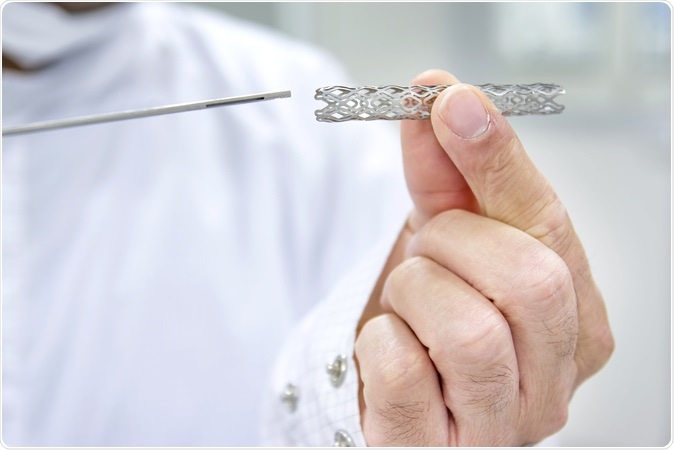Percutanous angioplasty involves insertion of a stent into a blocked or narrowed coronary artery that eases the blood flow and relieves the pain of severe angina or a heart attack. It is being routinely practiced worldwide. A new study called ORBITA, has revealed that not all patients who undergo this procedure benefit from it.

Stent. Image Credit: Ozgur Guvenc / Shutterstock
The study entitled “Percutaneous coronary intervention in stable angina (ORBITA): a double-blind, randomised controlled trial” was published this week in the journal Lancet.
During a heart attack the coronary arteries – or arteries that supply essential oxygenated blood to the heart muscles are blocked and narrowed. As a result the heart muscles are deprived of blood in a region and this leads to intense pain. Stents are threaded into the coronary arteries through a large artery usually in the groin to reach them and these stents open up the coronary arteries easing the blood flow and easing the pain and complications. This study looked at these stents which are essentially wired mesh or cages that can open up the narrowed arteries.
Heart attacks kill thousands of people every year and stents act as life savers in these conditions. Over 500,000 people worldwide need stents annually to relive their chest pain or angina. The process or angioplasty is expensive and costs between $11,000 to $41,000 in the United States.
Despite the widespread use, the expense and the skill required to perform this surgery, this new study proves that not all may actually benefit from percutaneous angioplasty. For this study Dr. Justin E. Davies, a cardiologist at Imperial College London, and his team included 200 patients who had complete blockages in their coronary arteries and had such severe chect pain that their activities of daily living were severely hampered.
These are usually common reasons for insertion of a stent. All of the participants were given medications such as a statin to reduce the atherosclerosis and blood cholesterol plaques blocking up arteries. They received aspirin – a blood thinner anti-platelet drug that prevents plugs to form and clog up the arteries and blood pressure drugs to keep the blood pressure under control. They also received medications that could ease the chest pain or angina. The patients were divided into two groups. Both group underwent an angioplasty operation like set up.
While half of them (105) actually received a stent, the other half (95) did not actually received a stent and a sham procedure was faked. This was the control group.
According to the normal procedure protocol, a catheter was threaded into the patient’s heart via an artery in the groin or wrist and once it reached the blockage, they either inserted the stent or pulled the catheter out without inserting a stent.
The patients were unaware of the sham procedure and all 200 believed they had received the stents. The procedure – sham or otherwise, was performed by a different set of persons and the ones who analyzed the results were also in the dark about who had received the stent and who had not.
This process of not letting the patient or the person assessing the results, know the actual procedure performed is called blinding. It yields more robust results without causing bias during analysis.
Six weeks after the treatment including medical treatment was continuously given the patients were analyzed. Both groups of patients reported a reduction in chest pain. They all performed better on the treadmill test that tests the physical ability of an angina patient. So actually the stents made no difference.
Dr. David L. Brown of Washington University School of Medicine and Dr. Rita F. Redberg of the University of California, San Francisco, wrote in an editorial published with the new study saying that current guidelines that recommend stenting should be revised completely.
Dr. Davies added that not all patients wanted to take the drugs meant to reduce the chest pain and the risk of heart attacks so stenting perhaps could not be written out altogether yet. In any case his study was difficult to perform since most ethics groups opposed the idea of subjecting half of the patients to a sham procedure.